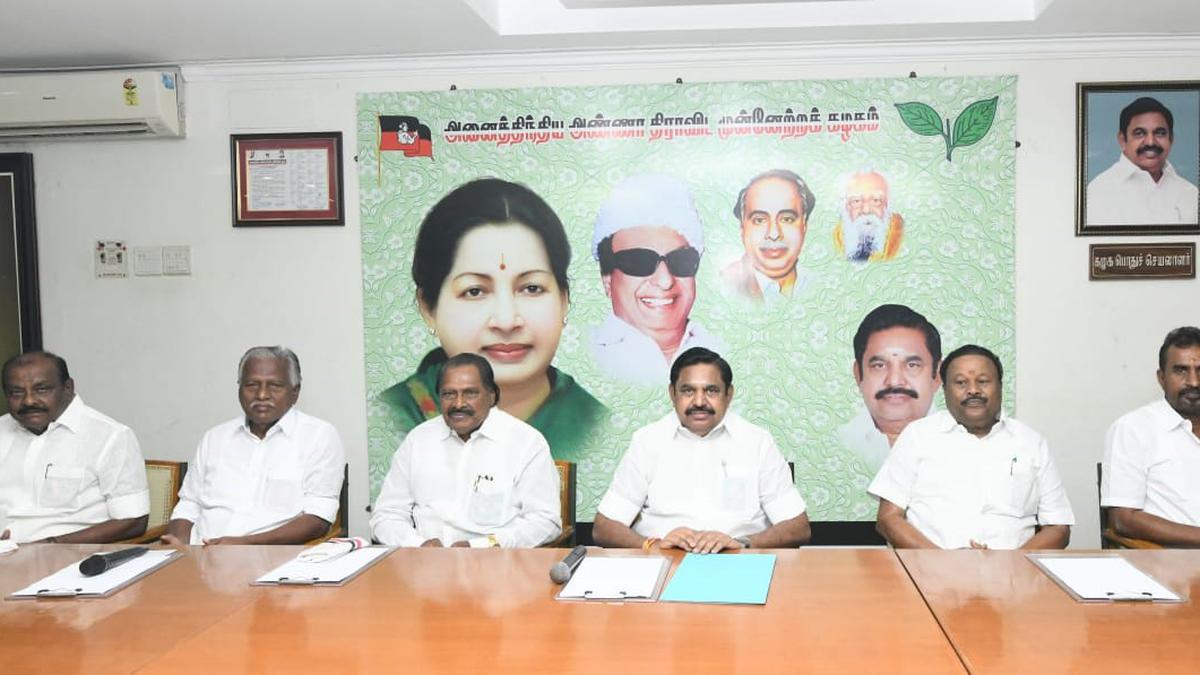
Palaniswami chairs AIADMK meeting of functionaries and legislators
The Hindu
Former Minister D. Jayakumar told journalists that strategies were discussed to highlight the reported inadequacies of the DMK government.
AIADMK general secretary Edappadi K. Palaniswami on Sunday chaired a meeting of the party’s senior functionaries, MPs and MLAs, and adviced them on the steps to be taken ahead of the 2024 Parliamentary election.
AIADMK presidium chairman A. Tamilmagan Hussain; treasurer Dindigul C. Sreenivasan; deputy general secretaries K.P. Munusamy and Natham R. Viswanathan; and headquarters secretary S.P. Velumani; were among the prominent leaders who participated in the meeting at the party’s headquarters here.
Former Minister D. Jayakumar told journalists that strategies were discussed to highlight the reported inadequacies of the DMK government.
Replying to a query on Minister Udhayanidhi Stalin’s reported comment that he was not worried even if the government was dissolved over his call to abolish Sanatana Dharma, Mr. Jayakumar said the Minister made such a comment only because he was sure that the government would not last.
Asked about Mr. Udhayanidhi’s comment that the AIADMK should spell out its stand on Sanatana Dharma, Mr. Jayakumar said their leader [C.N. Annadurai, founder of the DMK] had guided them through the slogan Ondre Kulam, Oruvane Dhevan and that there was no division based on community or caste.
“This is a diversion tactic. Like our general secretary said, there are numerous other problems in Tamil Nadu today,” Mr. Jayakumar said.

“Writing, in general, is a very solitary process,” says Yauvanika Chopra, Associate Director at The New India Foundation (NIF), which, earlier this year, announced the 12th edition of its NIF Book Fellowships for research and scholarship about Indian history after Independence. While authors, in general, are built for it, it can still get very lonely, says Chopra, pointing out that the fellowship’s community support is as valuable as the monetary benefits it offers. “There is a solid community of NIF fellows, trustees, language experts, jury members, all of whom are incredibly competent,” she says. “They really help make authors feel supported from manuscript to publication, so you never feel like you’re struggling through isolation.”

Several principals of government and private schools in Delhi on Tuesday said the Directorate of Education (DoE) circular from a day earlier, directing schools to conduct classes in ‘hybrid’ mode, had caused confusion regarding day-to-day operations as they did not know how many students would return to school from Wednesday and how would teachers instruct in two modes — online and in person — at once. The DoE circular on Monday had also stated that the option to “exercise online mode of education, wherever available, shall vest with the students and their guardians”. Several schoolteachers also expressed confusion regarding the DoE order. A government schoolteacher said he was unsure of how to cope with the resumption of physical classes, given that the order directing government offices to ensure that 50% of the employees work from home is still in place. On Monday, the Commission for Air Quality Management in the National Capital Region and Adjoining Areas (CAQM) had, on the orders of the Supreme Court, directed schools in Delhi-NCR to shift classes to the hybrid mode, following which the DoE had issued the circular. The court had urged the Centre’s pollution watchdog to consider restarting physical classes due to many students missing out on the mid-day meals and lacking the necessary means to attend classes online. The CAQM had, on November 20, asked schools in Delhi-NCR to shift to the online mode of teaching.









